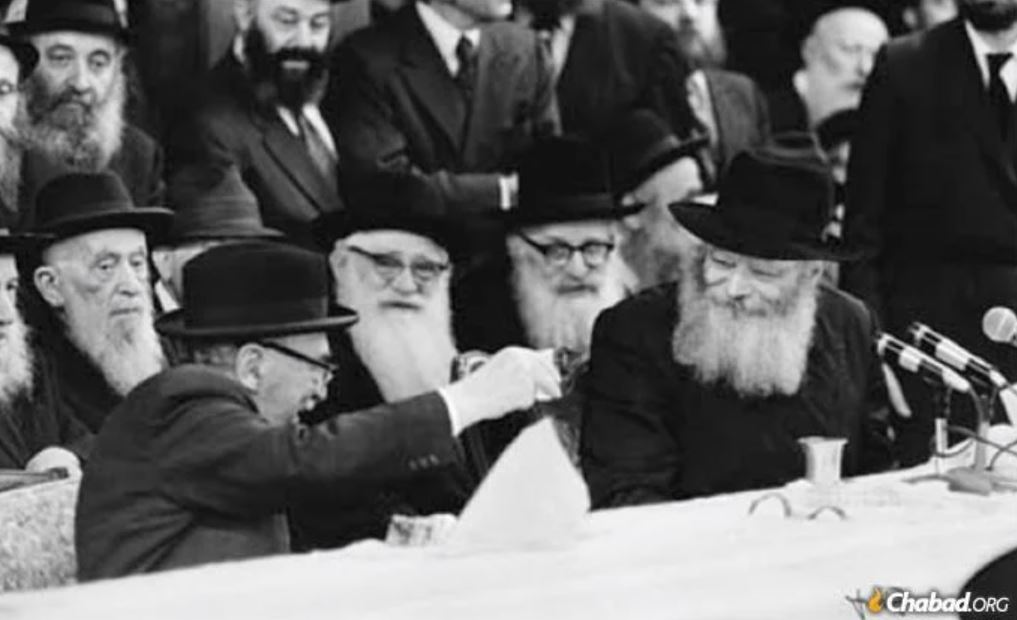Greatest of Sages
 Hillel (c. 110 BCE-10 CE) was born in Babylon to a poor Jewish family, descended from the tribes of Judah and Benjamin. To make a living, Hillel worked as a lumberjack. At the age of 40, he decided to move to Israel and further his Jewish studies. He went to work each morning and earned just enough to pay for his family’s needs, and for the tuition to the Jerusalem yeshiva of the sages Shemaiah and Avtalion. One winter, when he didn’t have the funds to pay the yeshiva fee, Hillel climbed up to the roof to listen in to the classes from the chimney. He was so engrossed in the learning that he didn’t realize the snowstorm that began to brew around him. In the morning, the yeshiva students noticed the clogged chimney and went up to find Hillel frozen on top of it. For his dedication, he was granted free tuition for life. Hillel went on to become the greatest rabbi in the world. He headed the Jerusalem yeshiva, and was also elected president (nasi) of Israel, and chief of the Sanhedrin. He had eighty pairs of disciples, including the famed rabbis Yonatan ben Uziel and Yochanan ben Zakkai. Hillel was famous for his incredible patience. In one account, a man made a bet that he could get Hillel angry so he bothered Hillel incessantly on the eve of Shabbat, yet Hillel remained calm and pleasant. When the man admitted to the bet and told Hillel how he lost 400 zuz, a huge sum of money, Hillel replied: “It is better that you lose 400 zuz, and even another 400 zuz, than that I should get angry!” The school of Hillel became the dominant school in Judaism, and to this day Jewish law always rules according to Beit Hillel. He is one of the most-oft cited sages in the Mishnah, the ancient corpus of Jewish law. Among his most well-known teachings is the Golden Rule: “That which is hateful to you, do not do to your fellow”, and “If I am not for myself, who will be for me? If I am only for myself, what am I? And if not now, when?” Finally, it was Hillel who instituted the prozbul: In the sabbatical Shemitah year (such as the one beginning next week), the Torah commands that all personal debts between Jews must be cancelled. Because of this, Jews started to avoid handing out loans in the months before the sabbatical, worried that they would never be repaid. To ensure that the needy could still draw loans, Hillel crafted an important legal loophole known as the prozbul, still widely used. According to tradition, Hillel lived 120 years. He stood up for the poor and oppressed, and was beloved for his kindness, charity, and positivity. The Sages would later remark that each person should strive “to be humble and patient like Hillel.”
Hillel (c. 110 BCE-10 CE) was born in Babylon to a poor Jewish family, descended from the tribes of Judah and Benjamin. To make a living, Hillel worked as a lumberjack. At the age of 40, he decided to move to Israel and further his Jewish studies. He went to work each morning and earned just enough to pay for his family’s needs, and for the tuition to the Jerusalem yeshiva of the sages Shemaiah and Avtalion. One winter, when he didn’t have the funds to pay the yeshiva fee, Hillel climbed up to the roof to listen in to the classes from the chimney. He was so engrossed in the learning that he didn’t realize the snowstorm that began to brew around him. In the morning, the yeshiva students noticed the clogged chimney and went up to find Hillel frozen on top of it. For his dedication, he was granted free tuition for life. Hillel went on to become the greatest rabbi in the world. He headed the Jerusalem yeshiva, and was also elected president (nasi) of Israel, and chief of the Sanhedrin. He had eighty pairs of disciples, including the famed rabbis Yonatan ben Uziel and Yochanan ben Zakkai. Hillel was famous for his incredible patience. In one account, a man made a bet that he could get Hillel angry so he bothered Hillel incessantly on the eve of Shabbat, yet Hillel remained calm and pleasant. When the man admitted to the bet and told Hillel how he lost 400 zuz, a huge sum of money, Hillel replied: “It is better that you lose 400 zuz, and even another 400 zuz, than that I should get angry!” The school of Hillel became the dominant school in Judaism, and to this day Jewish law always rules according to Beit Hillel. He is one of the most-oft cited sages in the Mishnah, the ancient corpus of Jewish law. Among his most well-known teachings is the Golden Rule: “That which is hateful to you, do not do to your fellow”, and “If I am not for myself, who will be for me? If I am only for myself, what am I? And if not now, when?” Finally, it was Hillel who instituted the prozbul: In the sabbatical Shemitah year (such as the one beginning next week), the Torah commands that all personal debts between Jews must be cancelled. Because of this, Jews started to avoid handing out loans in the months before the sabbatical, worried that they would never be repaid. To ensure that the needy could still draw loans, Hillel crafted an important legal loophole known as the prozbul, still widely used. According to tradition, Hillel lived 120 years. He stood up for the poor and oppressed, and was beloved for his kindness, charity, and positivity. The Sages would later remark that each person should strive “to be humble and patient like Hillel.”
Shana Tova u’Metuka! Have a Wonderful 5782!
The Kabbalah of Hillel and Shammai
Words of the Week
Gems from Hillel the Elder:
“Do not judge your fellow until you are in his place.”
“Whoever destroys one soul, it is as though he had destroyed the entire world. And whoever saves a life, it is as though he had saved the entire world.”
“Where there are no men, strive to be a man!”
“Do not say ‘When I have free time I shall study’ – for you may never have any ‘free time’.”
“Be like the disciples of Aaron: loving peace and pursuing peace, loving all of God’s creations, and drawing them closer to the Torah.”

 Reuven Rivlin (b. 1939) was born in Jerusalem to a family descended from the great
Reuven Rivlin (b. 1939) was born in Jerusalem to a family descended from the great  Schneur Zalman Rubashov (1889-1974) was born in the Belorussian town of Mir, near Minsk, to a deeply religious Chabad family, and was named after Chabad’s founder,
Schneur Zalman Rubashov (1889-1974) was born in the Belorussian town of Mir, near Minsk, to a deeply religious Chabad family, and was named after Chabad’s founder, 

